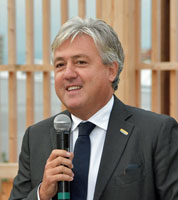A molecular Swiss Army knife may hold the key to making blue-green algae biofuel and biochemical production more viable. A research team from Michigan State University (MSU) fabricated a synthetic protein that both improves the assembly of the carbon-fixing factory of cyanobacteria while providing proof of concept for a device that could potentially improve plant photosynthesis or be used to install new metabolic pathways in bacteria. Study results were published this month in The Plant Cell journal.

MSU scientists have built a molecular Swiss Army knife that makes biofuels and other green chemical production from algae more viable. Photo by G.L. Kohuth
“The multifunctional protein we’ve built can be compared to a Swiss Army knife,” explained Raul Gonzalez-Esquer, MSU doctoral researcher and the paper’s lead author. “From known, existing parts, we’ve built a new protein that does several essential functions.”
For this research, Gonzalez-Esquer worked with Cheryl Kerfeld, the Hannah Distinguished Professor of Structural Bioengineering in MSU’s-DOE Plant Research Lab, and Tyler Shubitowski, MSU undergraduate student. Kerfield’s lab studies bacterial microcompartments, or BMCs. These are self-assembling cellular organs that perform myriad metabolic functions. In other words, they can be though of as molecular factories with many different pieces of machinery.
The research team modernized the factory by creating, in essence, a hybrid protein in cyanobacteria, organisms that have many potential uses for making green chemicals or biofuels. Basically the protein speeds up the process of taking CO2 out of the athmosphere and converting it to sugars.
“It’s comparable to making coffee. Rather than getting an oven to roast the coffee beans, a grinder to process them and a brewing machine, we’ve built a single coffeemaker where it all happens in one place,” Gonzalez-Esquer said. “The new tool takes raw material and produces the finished product with a smaller investment.”
However, this altered cyanobacterial species won’t be taking over any ponds near you just yet. While the improved organisms excel at photosynthesis in a lab setting, the researchers said they are still ill prepared to compete with other bacteria. Hopefully, this will change as the team continues to develop and refine the photosynthesis process in algae.











